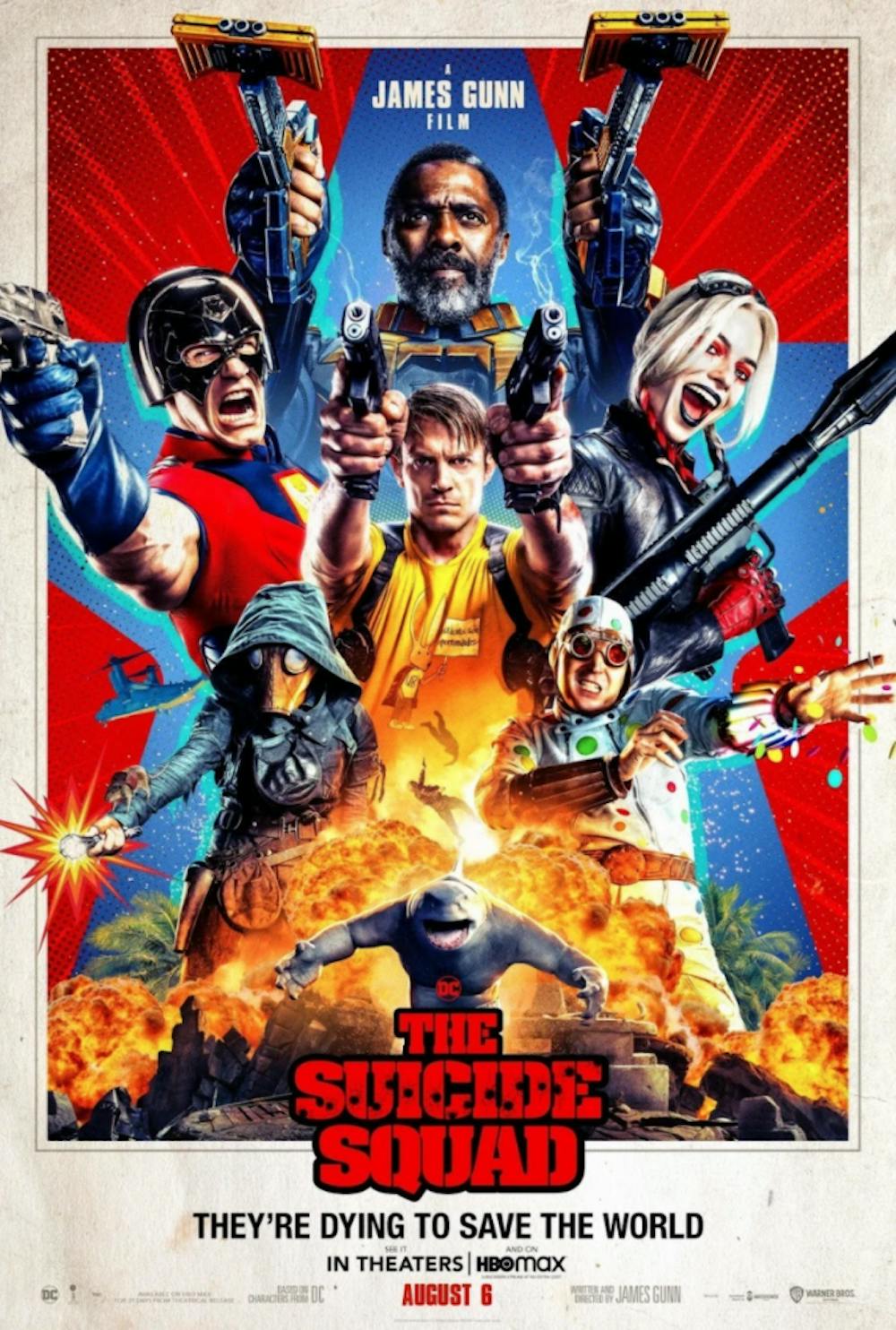 David Ayer’s 2016 film “Suicide Squad” was a failure of cinematic creativity. Awkwardly-written, sloppily-paced and with scenes stitched together as if at random, the comic book film attempted to capture the playfulness of the Marvel Cinematic Universe and the dark gravitas of Christopher Nolan’s “Dark Knight” trilogy. Instead, it ended up with neither, and the movie was quickly derided by critics for its futile reach for both comedy and drama.
David Ayer’s 2016 film “Suicide Squad” was a failure of cinematic creativity. Awkwardly-written, sloppily-paced and with scenes stitched together as if at random, the comic book film attempted to capture the playfulness of the Marvel Cinematic Universe and the dark gravitas of Christopher Nolan’s “Dark Knight” trilogy. Instead, it ended up with neither, and the movie was quickly derided by critics for its futile reach for both comedy and drama.
Five years later, director James Gunn has delivered a new film adaptation of the DC comics brand, brazenly titled “The Suicide Squad,” that sidesteps the identity crisis suffered by its predecessor for an unabashedly fun take on a franchise that is a perfect match for the singularly outrageous vision of the filmmaker.
“The Suicide Squad” follows a group of imprisoned supervillains who are recruited by government official Amanda Waller (played by a ruthless Viola Davis) to complete a so-called suicide mission in exchange for a 10-year reduction of their prison sentences. Their goal is to infiltrate Corto Maltese Island and destroy all evidence of what is known only as Project Starfish.
The roster of mostly second-rate characters from the comics is led off by Bloodsport (Idris Elba), the world’s most lethal marksman; Harley Quinn (Margot Robbie), a murderous sociopath who has become the star of the franchise; and Peacemaker (John Cena), an extremist willing to commit acts of brutal violence in the name of peace. Other featured characters, such as a walking-and-talking great white shark and a man who can dispel lethal polka dots from his body, are just as obscure. Gunn is once again at work making stars out of unknowns in the same way he did for Marvel’s hit “Guardians of the Galaxy.”
Gunn wastes no time in establishing his film as a much more spontaneous experience than the painfully self-serious 2016 version. A comically violent red herring opens the film, completely disorientating the audience in preparation for the gleeful chaos that unfolds once the surviving members of the Suicide Squad land on Corto Maltese. It is here that King Shark has to be talked out of eating his friends, Bloodsport and Peacemaker compete to kill enemies as creatively as possible and Harley Quinn escapes from and then massacres her captors as CGI flowers explode from their bloodied bodies.
These moments are played for dark laughs, but the real surprise of “The Suicide Squad” — and what truly elevates it above the 2016 film — is how it manages to layer real emotional stakes into the playful mayhem. In one instance, Ratcatcher 2 (Daniela Melchior) begins to cry while telling the team about the love she shared with her lost father. It is then genuinely moving to see her discover a sense of purpose in the film’s climax, which was something her father promised that she would find. Even something as seemingly ridiculous as an undisguisable King Shark waiting alone in a van as his friends try to blend in at a club earns the character compassion from the audience. These moments of pathos amidst the outrageous action prove the film’s ability to actualize the dual tonality that the original strove for in vain.
The film owes its success to the creative license that Gunn held over the project. Working from his own original screenplay with a $185 million budget and having been granted complete creative control by Warner Bros., he was able to inject all of his signature filmmaking tendencies into this film. It has his edgy but likeable characters, his hyper-stylized action and colorful visual effects, his unexpectedly emotional storytelling and, to top it all off, a healthy dose of gratuitous violence and profanity. Together, these features produce a newest Suicide Squad movie that is completely and appropriately over-the-top.
Within this efficient execution of the Suicide Squad mythos, there are a few features that deserve individual recognition. For one, Idris Elba is excellent as Bloodsport. An early scene, in which Elba gets into a fervent shouting match with his on-screen daughter, showcases the actor’s intense dramatic talents. He displays his comedic prowess when Bloodsport is forced to reveal his rat phobia while surrounded by Ratcatcher 2’s army of rodents, and in the concluding battle, Elba shows off his leading-man persona when he rallies his team against an extraterrestrial enemy. This last moment provides the film with its most moving sequence. Bloodsport finds the good in himself that he denied existed, and the Suicide Squad, a team of villains, takes a triumphant hero’s stand to save Corto Maltese. It is enhanced by John Murphy’s propulsive score, which never sounds better than when Bloodsport constructs his rifle to the beat of a pulsating electric guitar.
A bright, colorful mix of digital and practical effects displayed on a large 1.90:1 aspect ratio makes “The Suicide Squad” a visual delight. In fact, everything about this film is a delight. It won’t win Best Picture; it is not the seminal superhero masterpiece that was “The Dark Knight,” but it sure is a blast to watch. To steal a line from that other DC Comics film, this was the Suicide Squad movie that we needed and deserved.
Jack Torpey '24 (he/him) is an Arts and Culture Editor. He writes film reviews for the Reel Critic column.
Jack is studying English with a minor in Film and Media Culture. Outside The Campus, he works as a peer writing tutor at the Writing Center and is a member of the Middlebury Consulting Group.




